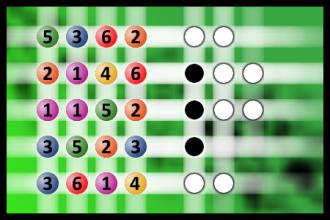Which is a winning combination of digits?
The computer chose a secret code (sequence of 4 digits from 1 to 6). Your goal is to find that code. Black circles indicate the number of hits on the right spot. White circles indicate the number of hits on the wrong spot.Correct answers: 58
The first user who solved this task is Sanja Šabović.
#brainteasers #mastermind

A cowboy, who just moved to Wy...
A cowboy, who just moved to Wyoming from Texas, walks into a bar and orders three mugs of Bud. He sits in the back of the room, drinking a sip out of each one in turn. When he finishes them, he comes back to the bar and orders three more.
The bartender approaches and tells the cowboy, "You know, a mug goes flat after I draw it. It would taste better if you bought one at a time."
The cowboy replies, "Well, you see, I have two brothers. One is in Arizona , the other is in Colorado . When we all left our home in Texas , we promised that we'd drink this way to remember the days when we drank together. So I'm drinking one beer for each of my brothers and one for myself."
The bartender admits that this is a nice custom, and leaves it there.
The cowboy becomes a regular in the bar, and always drinks the same way. He orders three mugs and drinks them in turn.
One day, he comes in and only orders two mugs. All the regulars take notice and fall silent. When he comes back to the bar for the second round, the bartender says, "I don't want to intrude on your grief, but I wanted to offer my condolences on your loss."
The cowboy looks quite puzzled for a moment, then a light dawns in his eyes and he laughs.
"Oh, no, everybody's just fine," he explains, "It's just that my wife and I joined the Baptist Church and I had to quit drinking."
"Hasn't affected my brothers though."
The bartender approaches and tells the cowboy, "You know, a mug goes flat after I draw it. It would taste better if you bought one at a time."
The cowboy replies, "Well, you see, I have two brothers. One is in Arizona , the other is in Colorado . When we all left our home in Texas , we promised that we'd drink this way to remember the days when we drank together. So I'm drinking one beer for each of my brothers and one for myself."
The bartender admits that this is a nice custom, and leaves it there.
The cowboy becomes a regular in the bar, and always drinks the same way. He orders three mugs and drinks them in turn.
One day, he comes in and only orders two mugs. All the regulars take notice and fall silent. When he comes back to the bar for the second round, the bartender says, "I don't want to intrude on your grief, but I wanted to offer my condolences on your loss."
The cowboy looks quite puzzled for a moment, then a light dawns in his eyes and he laughs.
"Oh, no, everybody's just fine," he explains, "It's just that my wife and I joined the Baptist Church and I had to quit drinking."
"Hasn't affected my brothers though."

